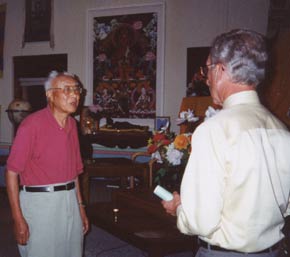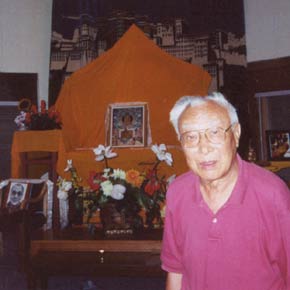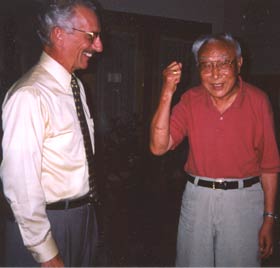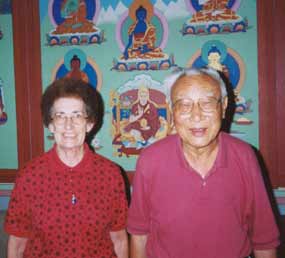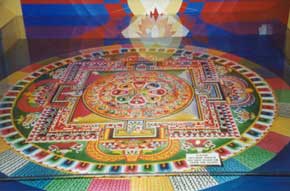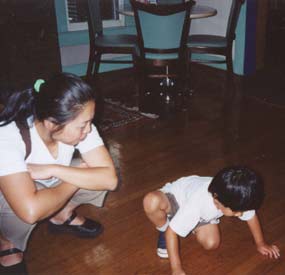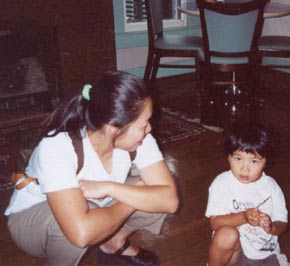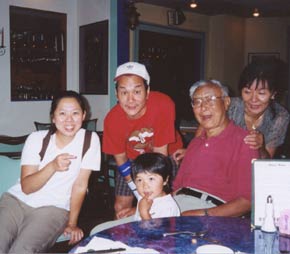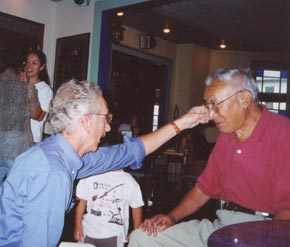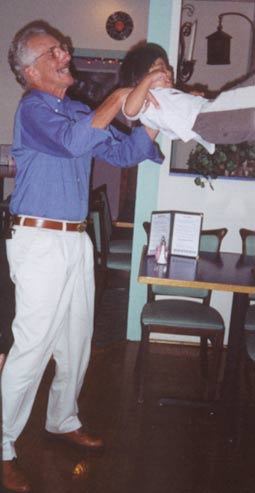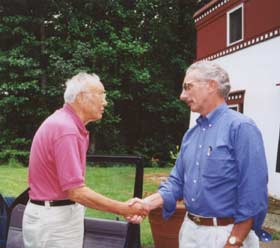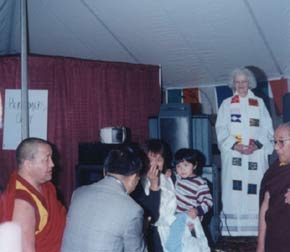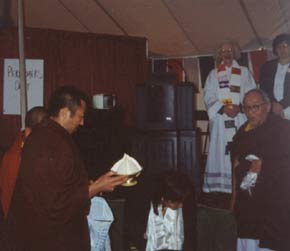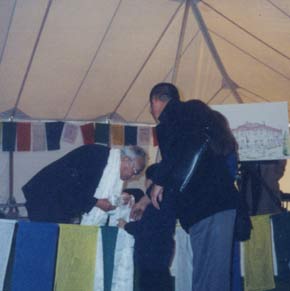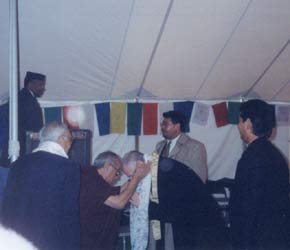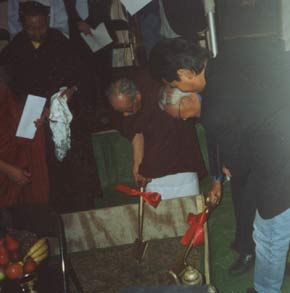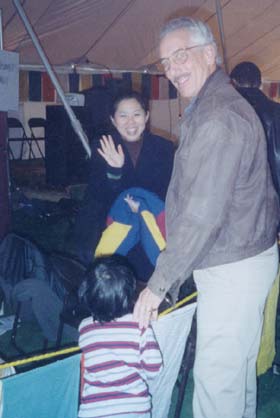|
Dr. Norbu:I left in 1951; my brother, His Holiness, left in l959. I'm an early bird. I just didn't want to live under the Chinese administration of Tibet.
Al: Your brother, the Dalai Lama, has
his headquarters in Northeast India.
Al: The other tenant of Buddhism that is
difficult for students to understand fully is the issue of
non-violence-especially when it came to invasion of your
country. My mother's side of the family are Quakers.
They seem to be a kind of American Buddhist-at least on the
non-violence issue.
Al: I want you to explain to my readers why Buddhists are non-violent. What is the issue for Buddhist? Dr. Norbu: Buddhists think that we are all related by reincarnation. We are all different, but we are all related. If we are violent, we might be violent to someone we are related to. We believe you had better not do anything like that to your own. Also, violence you do now, later will return again. So, we look for peace and non-violence. If you have violence, then you cannot have peace.
Al: Isn't it true that the Chinese are repopulating Tibet with Chinese? Dr. Norbu: Yes, that's true. If Tibetans don't work hard at preserving their culture and religion, there won't be a Tibet. It will be all Chinese. That's possible, very possible. So, that is why Tibetans need to work hard. That is why there is a Tibetan Cultural Center. I want everybody to know there was a Tibet.
Al: If I was a Tibetan, what would you want me to do to work hard? Dr. Norbu: We must work hard to keep our culture and our rights alive. Al: Your brother has been able to deal with non-violence very similar to how Gandhi or Martin Luther King did. Do you see whether or not that is catching on in the world today? Do you think that we are better as a world because of this or do you think we are pretty much the same and merely going through the motions. Dr. Norbu: My brother is doing non-violence and at the same time talking to the people. Everybody must do something to change-doing something for good is important. One person can't change the world; that is impossible. Al: So, he teaches others to do what he has done? Dr. Norbu: Yes. Al: But, is the world a better place today than it was yesterday? Dr. Norbu: Better. I think we need to be good people. I want to be a good person. That is the important thing. I want to help my society, my community. I think we should all do that. If everyone has that feeling, I think we should have a much better world. That is what my brother, the Dalai Lama, is trying to teach.
Al: You are also a Lama, aren't you? Dr. Norbu: Some Tibetans believe that I am the reincarnation of the teacher from a monastery-that is their belief. But who knows? I don't know anything-nothing. I don't talk about my last previous life. Sometimes, what I did yesterday, I don't remember. Al: I get that way too sometimes. When we get gray and older, we sometimes forget. After the selection process took place with your brother, when did he go to Lhasa? Dr. Norbu: He went to Lhasa when he was about 4 1/2 -years-old. There he was trained both religiously and politically.
Al: A number of years ago, I saw the movie, Seven Years in Tibet. Then last night, I watched it again to get a feel for Tibet and what went on with your brother. Did you know Heinrich Harrer, the Austrian, who became a friend of your brother? Dr. Norbu: Yes, I knew him. Al: Was the movie an accurate portrayal of him and his relationship with your brother? Dr. Norbu: His relationship with my brother is that they are both very good friends. The movie was just a kind of Hollywood movie. But Harrer still lives in Europe. He visits my brother often. Al: How would you want to be remembered; what would you like on your epitaph? Dr. Norbu: I would have nothing written, nothing. Al: Nothing? Why? Dr. Norbu: What does that matter? I'm just like one crazy man here. Al: What would your brother have written on his? He wouldn't say that he was just a crazy man. Dr. Norbu: I don't know what my brother would have written. I don't know. Al: I was kind of waiting for some profound thing-or even just "I love Tibet." Dr. Norbu: I love Tibet. But, probably in a few years, there won't be a Tibet. For us Tibetans, what do we do now that the Chinese occupy Tibet? They came in and put into prison many, many people. People were pulled out of homes and put into prisons. In jail they were tortured. What do you do?
Al: And what's the answer to that? Dr. Norbu: No answer. That is why the world is very sad. Sad world.
Al: If I had the power to say, "Come with me, we'll go back to Tibet. You and I will go to Tibet together. What would you want to show me? Give me five places that you would want to see and experience again? Dr. Norbu: Tibet doesn't exist. Because of the Chinese invasion, Tibet is completely different. Al: That is really tragic, a whole culture, a whole society changed forever. I can wax poetic what the Chinese have done against the Tibetan, but we have done the same thing to Native Americans. I admire the way that have you handled this. If I were in your shoes, I would be crying, sad, and angry. Dr. Norbu: If I try to cry, there is no more water inside now. No more tears. For those interested in visiting the web site of Dr. Norbu's Tibetan Cultural Center, just click on this hyperlink: http://www.tibetancc.com/ This link http://www.tibetancc.com/chamtseling.htmcalendar of events for will provide a the Spirit of Tibet Weekend, November 17-18, 2000. During the weekend, the official groundbreaking will take place for the temple about which Dr. Norbu spoke at the beginning of the interview. The following link is the Dalai Lama's site: http://www.tibet.com/ FAMILY PHOTO GALLERY
PHOTO GALLERY OF THE TEMPLE'S GROUNDBREAKING The Chamtse Ling Temple Chamtse Ling Temple's Groundbreaking 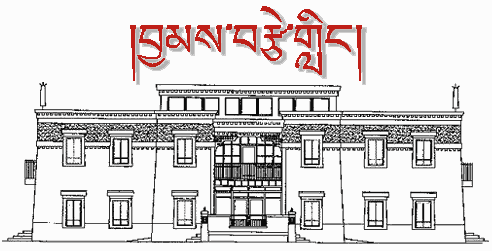
|







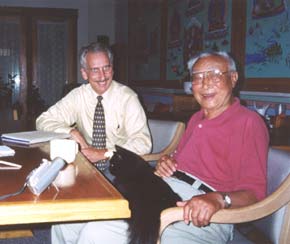 Al: How did you, the brother of the Dalai Lama, wind up in Bloomington, IN?
Al: How did you, the brother of the Dalai Lama, wind up in Bloomington, IN?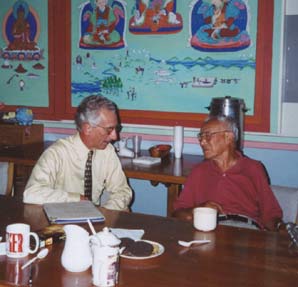 Al: This Cultural Center is a very lovely complex.
Al: This Cultural Center is a very lovely complex.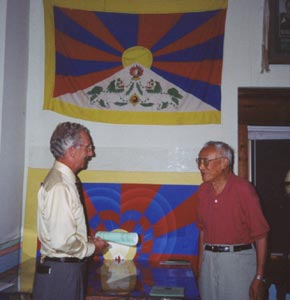 Al: Sounds like you were also a smart bird to leave when you did.
Al: Sounds like you were also a smart bird to leave when you did.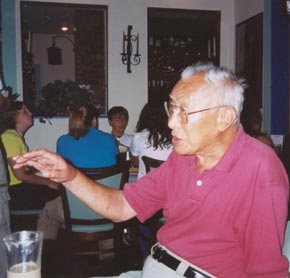
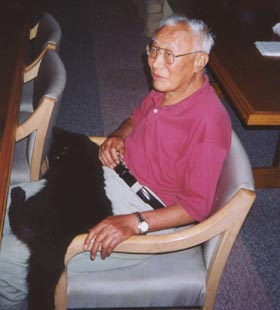
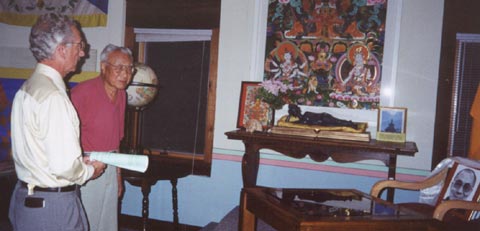
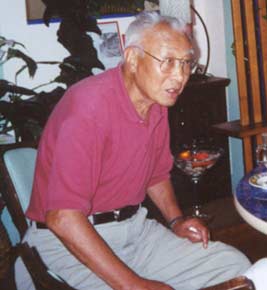 Al: From a Tibetan point of view,
hasn't the non-violent philosophy created
violence-especially for your people?
Al: From a Tibetan point of view,
hasn't the non-violent philosophy created
violence-especially for your people?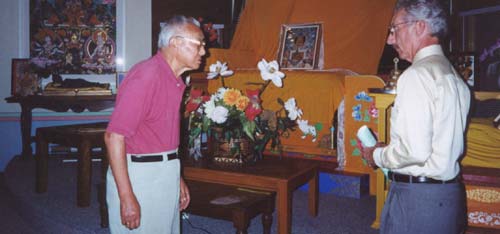
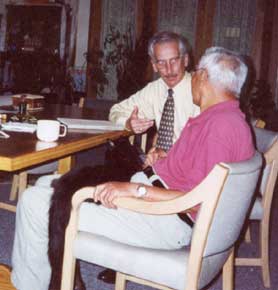
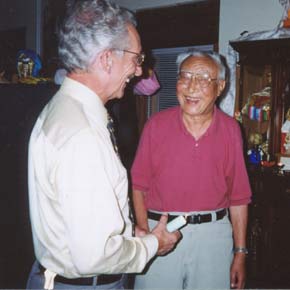
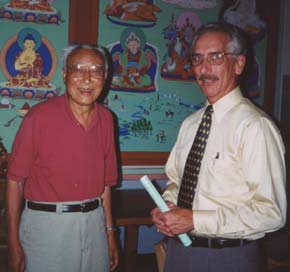 Al: Regarding your brother: can you tell me how he became the Dalai Lama?
Al: Regarding your brother: can you tell me how he became the Dalai Lama?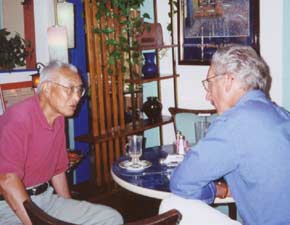
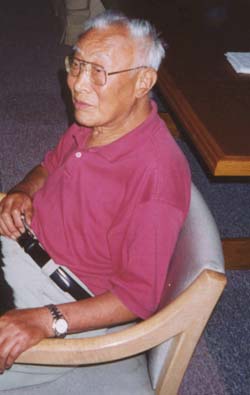
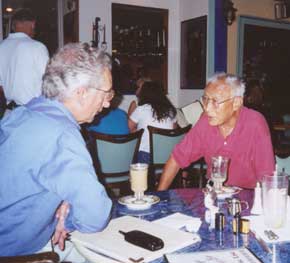 Al: I also feel sorry or hurt for all
the suffering of your people. If I were a Tibetan, I think
that I would be really angry. However, I don't get a
lot of hostility from you about losing your country. Is
that because of the karma issue? That if you start
fussing about it, are you creating bad karma for yourself?
Al: I also feel sorry or hurt for all
the suffering of your people. If I were a Tibetan, I think
that I would be really angry. However, I don't get a
lot of hostility from you about losing your country. Is
that because of the karma issue? That if you start
fussing about it, are you creating bad karma for yourself? 